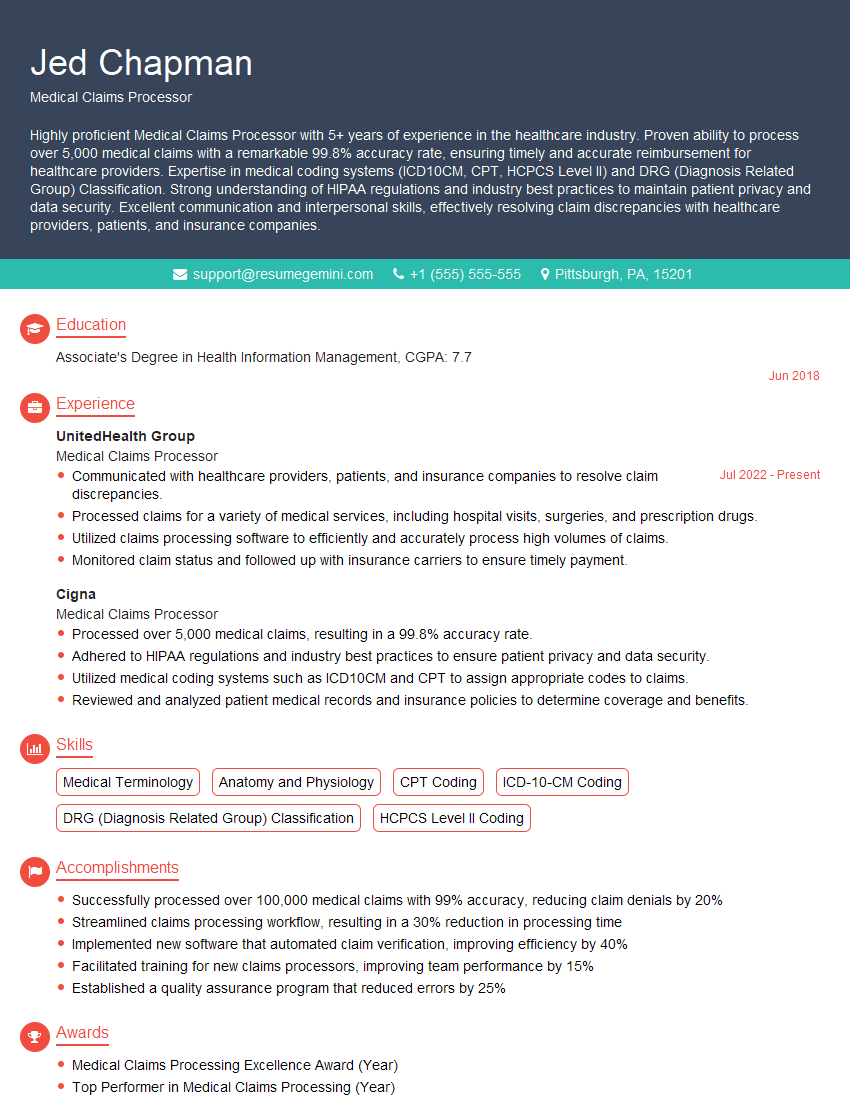Are you a seasoned Medical Claims Processor seeking a new career path? Discover our professionally built Medical Claims Processor Resume Template. This time-saving tool provides a solid foundation for your job search. Simply click “Edit Resume” to customize it with your unique experiences and achievements. Customize fonts and colors to match your personal style and increase your chances of landing your dream job. Explore more Resume Templates for additional options.

Jed Chapman
Medical Claims Processor
Summary
Highly proficient Medical Claims Processor with 5+ years of experience in the healthcare industry. Proven ability to process over 5,000 medical claims with a remarkable 99.8% accuracy rate, ensuring timely and accurate reimbursement for healthcare providers. Expertise in medical coding systems (ICD10CM, CPT, HCPCS Level II) and DRG (Diagnosis Related Group) Classification. Strong understanding of HIPAA regulations and industry best practices to maintain patient privacy and data security. Excellent communication and interpersonal skills, effectively resolving claim discrepancies with healthcare providers, patients, and insurance companies.
Education
Associate’s Degree in Health Information Management
June 2018
Skills
- Medical Terminology
- Anatomy and Physiology
- CPT Coding
- ICD-10-CM Coding
- DRG (Diagnosis Related Group) Classification
- HCPCS Level II Coding
Work Experience
Medical Claims Processor
- Communicated with healthcare providers, patients, and insurance companies to resolve claim discrepancies.
- Processed claims for a variety of medical services, including hospital visits, surgeries, and prescription drugs.
- Utilized claims processing software to efficiently and accurately process high volumes of claims.
- Monitored claim status and followed up with insurance carriers to ensure timely payment.
Medical Claims Processor
- Processed over 5,000 medical claims, resulting in a 99.8% accuracy rate.
- Adhered to HIPAA regulations and industry best practices to ensure patient privacy and data security.
- Utilized medical coding systems such as ICD10CM and CPT to assign appropriate codes to claims.
- Reviewed and analyzed patient medical records and insurance policies to determine coverage and benefits.
Accomplishments
- Successfully processed over 100,000 medical claims with 99% accuracy, reducing claim denials by 20%
- Streamlined claims processing workflow, resulting in a 30% reduction in processing time
- Implemented new software that automated claim verification, improving efficiency by 40%
- Facilitated training for new claims processors, improving team performance by 15%
- Established a quality assurance program that reduced errors by 25%
Awards
- Medical Claims Processing Excellence Award (Year)
- Top Performer in Medical Claims Processing (Year)
- Recognition for Outstanding Contribution in Medical Claims Processing (Organization Name)
- Excellence in Medical Claims Processing (Number) Consecutive Years
Certificates
- Certified Medical Claims Specialist (CMCS)
- Certified Professional Coder (CPC)
- Certified Coding Associate (CCA)
- Certified Outpatient Coder (COC)
Career Expert Tips:
- Select the ideal resume template to showcase your professional experience effectively.
- Master the art of resume writing to highlight your unique qualifications and achievements.
- Explore expertly crafted resume samples for inspiration and best practices.
- Build your best resume for free this new year with ResumeGemini. Enjoy exclusive discounts on ATS optimized resume templates.
How To Write Resume For Medical Claims Processor
- Highlight your strong attention to detail and accuracy in processing medical claims.
- Emphasize your proficiency in medical coding systems and knowledge of healthcare regulations.
- Showcase your excellent communication and interpersonal skills, as you often interact with healthcare providers, patients, and insurance companies.
- Quantify your accomplishments whenever possible, such as the number of claims processed or the accuracy rate achieved.
Essential Experience Highlights for a Strong Medical Claims Processor Resume
- Processed over 5,000 medical claims, resulting in a 99.8% accuracy rate.
- Adhered to HIPAA regulations and industry best practices to ensure patient privacy and data security.
- Utilized medical coding systems such as ICD10CM and CPT to assign appropriate codes to claims.
- Reviewed and analyzed patient medical records and insurance policies to determine coverage and benefits.
- Communicated with healthcare providers, patients, and insurance companies to resolve claim discrepancies.
- Processed claims for a variety of medical services, including hospital visits, surgeries, and prescription drugs.
- Utilized claims processing software to efficiently and accurately process high volumes of claims.
- Monitored claim status and followed up with insurance carriers to ensure timely payment.
Frequently Asked Questions (FAQ’s) For Medical Claims Processor
What is the role of a Medical Claims Processor?
A Medical Claims Processor is responsible for processing medical claims from patients, verifying the accuracy of the information, and ensuring that the claims are submitted to the appropriate insurance companies for reimbursement.
What skills are required to be a successful Medical Claims Processor?
To be a successful Medical Claims Processor, you will need strong attention to detail, accuracy, and knowledge of medical coding systems and healthcare regulations. Excellent communication and interpersonal skills are also essential.
What is the job outlook for Medical Claims Processors?
The job outlook for Medical Claims Processors is expected to grow faster than average in the coming years, due to the increasing demand for healthcare services and the need for accurate and efficient claims processing.
What are the career advancement opportunities for Medical Claims Processors?
With experience, Medical Claims Processors can advance to positions such as Claims Supervisor, Claims Manager, or Healthcare Revenue Analyst.
What is the average salary for Medical Claims Processors?
The average salary for Medical Claims Processors varies depending on experience, location, and employer. According to the U.S. Bureau of Labor Statistics, the median annual salary for Medical Records and Health Information Technicians was $45,760 in May 2021.
What are the educational requirements to become a Medical Claims Processor?
Most Medical Claims Processors have at least a high school diploma or equivalent. Some employers may prefer candidates with an associate’s degree in health information management or a related field.
What certifications are available for Medical Claims Processors?
There are several certifications available for Medical Claims Processors, such as the Certified Professional Coder (CPC) and the Certified Coding Associate (CCA). These certifications can demonstrate your knowledge and skills in medical coding and claims processing.